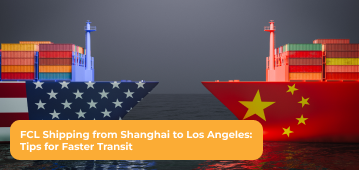Different types of cargo insurance to protect your goods
Although the internet has shrunk the geographical distance between places virtually, it’s yet to do it physically. Therefore transportation of goods from one place to another requires a physical medium like cargo and logistics. Transportation of goods around the world, be it by land, water, or air, remains one of the primary ways of logistics. Transportation by any medium is becoming more and more secure over time, but it is not completely risk-free. That is where cargo insurance can come in handy. Cargo insurance is the method that ensures the goods are protected against potential losses or risks which may occur during transportation. Cargo insurance would make sure the goods are protected, and their values are retained.
Different types of cargo insurance
● Land Cargo Insurance
Land cargo insurance is coverage of goods that are transported via road or rail; it may be via truck or train. It will protect goods from theft, damage from collisions, fires and more. The drawback of land cargo insurance is that it only covers the losses that occur when goods are transported within the country.
● Marine Cargo Insurance
Ocean cargo insurance is coverage of goods that are transported across water bodies, generally over international borders. The insurance covers damages due to loading and unloading, extreme weather, piracies, ship shrinking and more.
● Air Cargo Insurance
Air cargo insurance is coverage of goods that are transported via air. It covers items that are damaged, destroyed or lost during transit. Air cargo insurance covers damage due to extreme weather, mishandling, plane fires and more.
Types of cargo insurance coverage
● All Risk
All risk is the broadest type of insurance coverage. These policies cover all risks of damage or shipments lost during transportation. There are some exclusions under all-risk coverage, which include:
◦ Products that are prone to damage
◦ Deterioration of time-sensitive goods
◦ War, strikes and riots
◦ External factors such as natural disaster or act of god
● Warehouse to Warehouse
Warehouse to warehouse insurance provides coverage of cargo in transit from one warehouse to another. This type of policy is commonly used within supply chain management.
● Named Peril Policy
Named peril policies (formerly known as “With Average” and “Free of Particular Average”) offer the narrowest coverage. Contradictory to the all-risk policy, the named peril policy only covers what is listed within the contract. Named peril policy common coverage includes:
◦ Burning
◦ Stranding
◦ Ship sinking
◦ Ship collisions
◦ Extreme weather
◦ Theft
● General Average
Under general average, all damage or losses caused during an unforeseen problem are to be divided among the owners of the surviving merchandise onboard. General average insurance depends on the outcome of your cargo following a peril. The owner of the cargo that has not suffered damages is liable to fork out financial compensation to the owner whose cargo has been damaged or lost.
Protect the value of your goods
Everybody wants their valuable goods to reach their destination securely. We at ECU360 are creating a kind of future for logistics that will deliver a customer-centric shipping experience. Shipping your valuable goods across the world is just one click away. With features like quick booking, which makes every booking possible in under 30 seconds, instant quote on pickup and delivery in over 50 countries, plan your sailing schedule weeks in advance and upload your shipping instructions all in one place.
With all that being said, it has become crucial to insure your valuable goods during any kind of transportation. At ECU360, we are not only making logistics seamless and hassle-free but also providing a kind of protection to your valuable goods that will help them reach their destination safe and sound.
ECU360 provides its customers a complete logistics solution, while customizing its services according to the requirements of the customer. Visit our Website and get your quote now.
Like





Comments